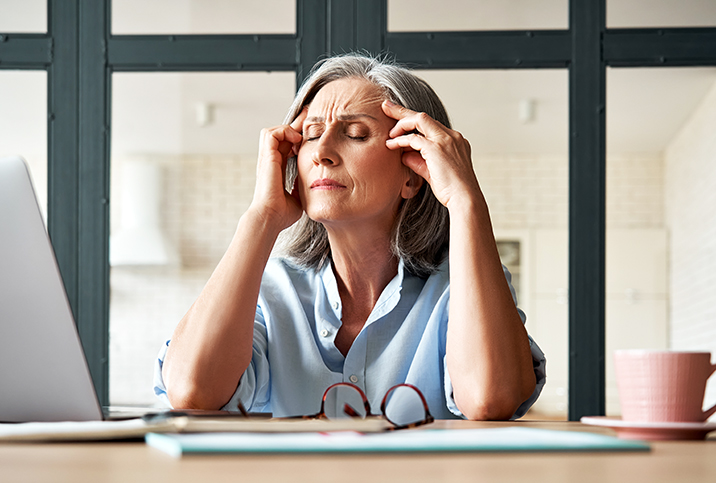5 Ways Women's Bodies Change After 65, and What to Do About It

By the time a woman turns 65 years old, she is well into her postmenopausal years. This is not necessarily a bad thing, said Mindy Pelz, a nutritionist and functional health professional based out of Washington, D.C.
"Being postmenopausal has many upsides, but also some downsides that might need to be addressed," Pelz said. "As they go past the menopausal years, many women discover that the symptoms they accumulated through the menopause experience are still hanging around."
Pelz added that a woman being older than 65 and being postmenopausal can increase the risk of certain diseases, such as hormonal cancers, Alzheimer's disease and cardiovascular disease.
"You have to make sure that a 65-year-old woman has course-corrected with her lifestyle to match her hormonal reality," Pelz explained.
With all this in mind, though, what changes can you expect when you reach age 65? And what positive lifestyle changes can you make to combat them?
Joint health and mobility deteriorates
Aleece Fosnight, a board-certified physician assistant specializing in sexual medicine, women's health and urology, and medical advisor at Aeroflow Urology, noted that aging causes tissues and cartilage in joints to deteriorate over time.
The prevalence of osteoarthritis increases with age—by age 65, 30 percent to 50 percent of adults suffer from the condition. A study that looked specifically at knee osteoarthritis in 1,420 people over age 60 found that the prevalence increased with each decade of life, from 33 percent among those ages 60 to 70 to 43.7 percent in people older than 80.
Aging causes tissues and cartilage in joints to deteriorate over time.
Unfortunately, osteoarthritis is not a gender-equal condition. Research indicates it's more common in women. Compared to men the same age, women ages 50 to 60 years were 3.5 times more likely to develop hand osteoarthritis and 40 percent more likely to develop knee osteoarthritis than men. The same trend is seen in other joints. Such joint pain can cause mobility issues and limit physical activity.
"Loss of muscle mass and joint stability—from weak muscles—puts more strain on the joints," Fosnight said.
However, all is not lost. There are ways to boost your joint health. Fosnight suggests increasing weight-bearing exercises to combat muscle mass loss and consider opting for a Mediterranean diet or a whole-food plant-based diet—though studies are minimal, these types of diets have been shown to help improve mobility and reduce pain in osteoarthritis.
Hair loss and thinning
As you age, you may notice that your hair begins to thin and you could experience some hair loss as well.
"Almost 55 percent of women by age 65 begin to experience some type of hair loss or hair thinning," Fosnight explained, listing various causes of hair loss relating to:
- Genetic factors
- Hormonal changes (loss of estrogen and thyroid changes)
- Vitamin or nutritional deficiency
- Certain prescription medicines
- Stress
"While some types of hair loss are genetic—female pattern baldness—and may be difficult to treat or prevent, there can be ways to slow the progression or prevent it," Fosnight advised.
She recommends eating an adequate nutritional diet—especially as restrictive diets can cause hair loss—and managing stress to help with hair loss and thinning.
Hair loss may also come as a result of daily damage. As a woman ages, her scalp produces less oil, so frequent shampooing may strip the hair and make it more susceptible to breakage and therefore loss. Consider reducing how often you shampoo. Heat and chemical treatment as well as UV radiation can also worsen age-related hair thinning. Consider altering or paring back your styling routine, and getting in the habit of wearing a protective hat or using UV-protective hair products.
Your sleep suffers as you get older
According to Meg Mill, Pharm.D., a functional medicine health practitioner and clinical pharmacist, if you have difficulty falling asleep and wake up throughout the night, you're not alone.
"As you age, you are less likely to sleep soundly and consistently because your body produces less melatonin," Mill said.
According to the National Sleep Foundation, changes in sleep patterns are a normal part of the aging process and generally lead to changes to your internal body clock. Studies indicate many older people have insufficient exposure to daylight, which directly impacts their body clock and circadian rhythms. Combine this with less melatonin and changes in other hormones that affect sleep—such as cortisol—and there should be no surprise that it's harder to get a good night's sleep as you age.
Although some people think you need less sleep as you age, this is only true until about age 60. The guidelines produced by the National Sleep Foundation state people older than 65 should still strive for seven to eight hours of sleep every night.
Mill recommends the following steps to improve your chances of getting deep, restful sleep:
- Exercise regularly.
- Get out in the daylight throughout the daytime.
- Keep your room cool, dark and quiet, with little distractions.
- Avoid caffeine after 2 p.m.
- Find a calming nighttime ritual to get your body in a resting state at bedtime.
The risk of depression increases after 65
"Depression greatly increases after the age of 65, and anxiety is reported almost twice as much in women than in men by this same age," Fosnight said. "And depression can look very different in women, too. Some of the warning signs you need to look out for are headaches or migraines, digestive problems or abdominal cramping, and energy loss and fatigue."
There are specific risk factors that can make depression more likely for women in this age group:
- Isolation
- Chronic illness
- Lack of physical activity
- Sleep problems
- Functional limitations and disabilities
- Hearing loss—8.5 percent of people between ages 55 and 64 have disabling hearing loss, but this greatly increases at age 65 to 25 percent
Depression can be debilitating and is not something to be taken lightly. Try to speak to your family, friends and especially your family physician if you are experiencing symptoms of depression. There are many types of counseling, talk therapies and medications that can help. Sometimes, you may need a combination of treatments. Everyone's journey is different.
There are also lifestyle changes you can make at home to help with the symptoms of depression, including:
- Being physically active.
- Getting a good night's sleep (aim for the recommended seven to eight hours).
- Eating a balanced diet. There are diets—such as the low-sodium DASH diet—that have been shown to reduce the risk of depression.
- Trying to continue the activities you enjoy and socialize with people regularly, including keeping in touch with family, friends and neighbors.
Thanks for the memory changes
"You may notice some changes in memory as you age," Mill said. "For example, recalling information that you just learned can be more difficult. However, long-term memory functions, such as performing familiar tasks or recalling general knowledge, don't change as much."
The risk of Alzheimer's disease and dementia increases with age, too.
"There is a questionable link between lack of estrogen and progesterone as a cause of worsening Alzheimer's and dementia," Fosnight explained. "Several research studies have seen a worsening decline of both these mental health concerns with early menopause or surgical menopause."
According to the Alzheimer's Society, more women are affected by dementia than men, outnumbering them two to one worldwide. Clinical research shows the rate at which brain cells die is faster as a woman's brain ages than a man's, too.
Interestingly, Fosnight cited one clinical study that found early intervention with estrogen in women under 65 or within 10 years of their final menstrual period actually showed a decreased risk of Alzheimer's and dementia. However, there is still ongoing research into whether starting hormone replacement therapy (HRT) earlier can reduce the risks.
If you're just experiencing a few memory problems, Mill advises adding omega-3 fatty acids found in fish oil into your diet.
The Alzheimer's Society advises that maintaining heart health is an excellent way to lower dementia risk. Other ways to help lower the risk of dementia include:
- Stopping smoking and reducing alcohol
- Eating a healthy balanced diet
- Getting regular exercise
- Staying mentally and socially active
"Omega-3 fatty acids play an essential role in brain function and development and [could] help combat memory loss," Mill stated. "Salmon, mackerel, flaxseed and walnuts are all foods that are high in omega-3 fatty acids."
It should be noted, however, that most research in this area has been conducted only on supplements, not dietary changes, and the research itself has been minimal and not long-term. The most consistent beneficial results have been seen in people who have mild cognitive impairment.
Looking at your body as a whole, Pelz states that every 65-year-old woman should consider these four helpful lifestyle changes to match the changing hormone levels she is experiencing:
- Compress the period in which you eat—also known as intermittent fasting. This will help you become more insulin sensitive.
- Switch to complex carbohydrates instead of simple carbohydrates, and cut back on processed foods.
- Improve the health of your microbiome by adding in more polyphenols, probiotics and prebiotic-rich foods. This will support a healthy estrobolome, which breaks down the low levels of estrogen you are producing to be more usable by the body.
- Avoid endocrine disruptors in packaging, household cleaners, toiletries, cosmetics, etc.


















